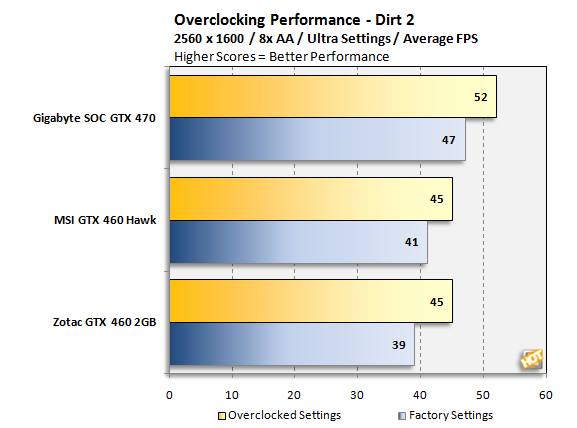Mid-Range NVIDIA GPU Battle: GTX 460 vs. GTX 470
|
Overclocking is not an exact science. When it comes to overclocking headroom, every GPU is different. And just because your friend's GTX 460 hit 900MHz doesn't mean that yours will, even when using the same settings and other hardware. Many factors can influence what a video card is capable of, starting with the unique characteristics of each GPU. Other factors may also include complementary components within the system, but we find the primary influence depends on the type of cooling used on the graphics card and the GPU voltage.
The graphs below show the performance from three of the games we used to test the NVIDIA-based video cards in this round-up. With each game, we're displaying the average frame rates of each card at their designated frequencies straight out of the box, along with the FPS recorded using the overclocked settings we were able to hit in our lab environment.



First, let's have a look at the Super Overclock GTX 470 from Gigabyte. Recall that the stock GTX 470 has a core clock of 607MHz. The SOC comes set at 700MHz, a decent 15% clock increase. Using Gigabyte's OCGuru software, we pushed the card even further and hit a stable 820MHz core, 900MHz memory frequency. That's 35% higher than reference design, and 17% more than the factory overclocked settings, which translates to a 14% performance hike in these particular games.
MSI's Hawk GTX 460 is up next. This speed demon arrives factory overclocked at 780MHz core, 900MHz memory. That's up from the 675MHz core clock of the reference design, which equals to a 16% increase before we even start to adjust any settings. Once we did, the Hawk soared to 910MHz core and 975MHz memory. On average, the higher frequencies landed us an additional 14% frame rate increase.
We also pushed Zotac's GTX 460 2GB model up a notch. From the factory overclock of 710MHz, we landed at 825MHz core and 1025MHz memory speed. This resulted in a 15% gaming performance boost.






